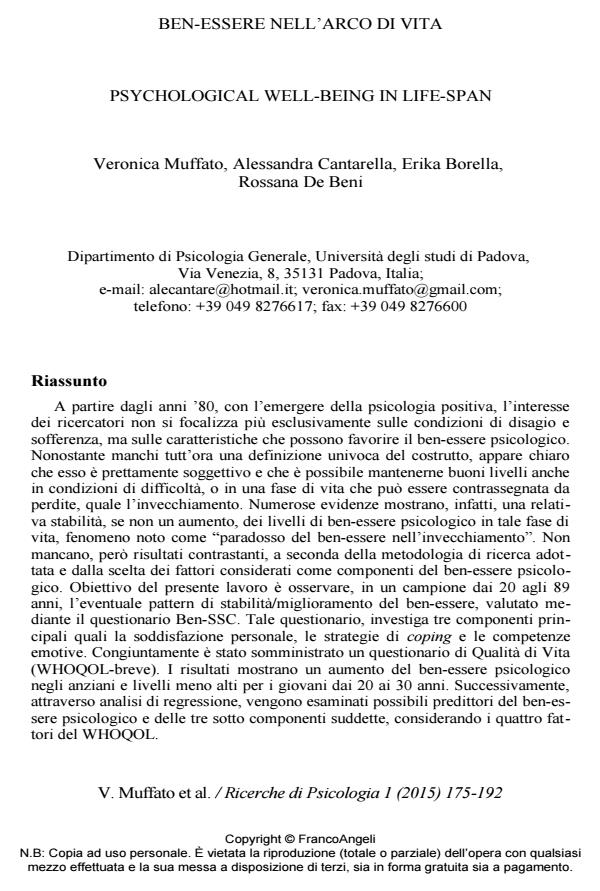Ben-essere nell’arco di vita
Titolo Rivista RICERCHE DI PSICOLOGIA
Autori/Curatori Veronica Muffato, Alessandra Cantarella, Erika Borella, Rossana De Beni
Anno di pubblicazione 2015 Fascicolo 2015/1
Lingua Italiano Numero pagine 18 P. 175-192 Dimensione file 286 KB
DOI 10.3280/RIP2015-001011
Il DOI è il codice a barre della proprietà intellettuale: per saperne di più
clicca qui
Qui sotto puoi vedere in anteprima la prima pagina di questo articolo.
Se questo articolo ti interessa, lo puoi acquistare (e scaricare in formato pdf) seguendo le facili indicazioni per acquistare il download credit. Acquista Download Credits per scaricare questo Articolo in formato PDF

FrancoAngeli è membro della Publishers International Linking Association, Inc (PILA)associazione indipendente e non profit per facilitare (attraverso i servizi tecnologici implementati da CrossRef.org) l’accesso degli studiosi ai contenuti digitali nelle pubblicazioni professionali e scientifiche
A partire dagli anni ’80, con l’emergere della psicologia positiva, l’interesse dei ricercatori non si focalizza piu esclusivamente sulle condizioni di disagio e sofferenza, ma sulle caratteristiche che possono favorire il ben-essere psicologico. Nonostante manchi tutt’ora una definizione univoca del costrutto, appare chiaro che esso e prettamente soggettivo e che e possibile mantenerne buoni livelli anche in condizioni di difficolta, o in una fase di vita che puo essere contrassegnata da perdite, quale l’invecchiamento. Numerose evidenze mostrano, infatti, una relativa stabilita, se non un aumento, dei livelli di ben-essere psicologico in tale fase di vita, fenomeno noto come "paradosso del ben-essere nell’invecchiamento". Non mancano, pero risultati contrastanti, a seconda della metodologia di ricerca adottata e dalla scelta dei fattori considerati come componenti del ben-essere psicologico. Obiettivo del presente lavoro e osservare, in un campione dai 20 agli 89 anni, l’eventuale pattern di stabilita/miglioramento del ben-essere, valutato mediante il questionario Ben-SSC. Tale questionario, investiga tre componenti principali quali la soddisfazione personale, le strategie di coping e le competenze emotive. Congiuntamente e stato somministrato un questionario di Qualita di Vita (WHOQOL-breve). I risultati mostrano un aumento del ben-essere psicologico negli anziani e livelli meno alti per i giovani dai 20 ai 30 anni. Successivamente, attraverso analisi di regressione, vengono esaminati possibili predittori del ben-essere psicologico e delle tre sotto componenti suddette, considerando i quattro fattori del WHOQOL.
Parole chiave:Ben-essere, arco di vita, invecchiamento, differenze d’eta.
- Stili educativi genitoriali, benessere scolastico e rendimento scolastico in adolescenza Maria Giulia Olivari, Eleonora Mascheroni, Gaia Cuccì, Emanuela Confalonieri, in RICERCHE DI PSICOLOGIA 1/2019 pp.9
DOI: 10.3280/RIP2019-001001
Veronica Muffato, Alessandra Cantarella, Erika Borella, Rossana De Beni, Ben-essere nell’arco di vita in "RICERCHE DI PSICOLOGIA " 1/2015, pp 175-192, DOI: 10.3280/RIP2015-001011